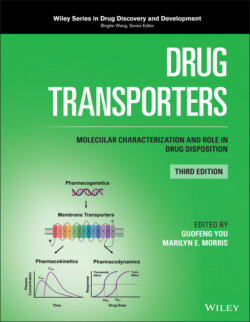Читать книгу Drug Transporters - Группа авторов - Страница 104
3.6.2.4 Other Endogenous Probe SubstratesNMN has
Оглавлениеlow protein binding and is filtered and secreted by the kidneys. A study evaluated the ability of pyrimethamine to inhibit MATE1 and MATE2‐K transport of NMN in vitro and in healthy volunteers (n = 8) [102]. Inhibition constants for pyrimethamine were 83 nmol/l for MATE1 and 56 nmol/l for MATE2‐K. Total Cmax of pyrimethamine after 50 mg was expected to be 8.3 μM (unbound Cmax 7.22 μM). Cmax/IC50 quotients predicted in vivo interactions with MATE1 and MATE2‐K, which was confirmed as the renal clearance of NMN was reduced in the presence of pyrimethamine. The study demonstrated the feasibility of using NMN as an endogenous probe to assess renal MATE function in humans with exposure to transporter inhibitors. Another study evaluated NMN and metformin pharmacokinetics in the presence and absence of trimethoprim. Healthy volunteers (n = 12) received metformin and underwent oral glucose tolerance tests [103]. With the exposure to trimethoprim for 5 days, metformin Cmax and AUC were increased between 20% and 30%, while renal clearance and creatinine clearance were decreased. Similar interaction results were observed for NMN following combination with trimethoprim. The authors reported good correlations between the endogenous (NMN) and exogenous (metformin) probes for renal clearance, which may support utilization of NMN in studies of MATE function in healthy volunteers.
The clearance of additional endogenous compounds has been shown to be altered in the urine of healthy volunteers with or without pyrimethamine (50 mg) [104]. Significantly lower renal clearance of thiamine (70–84%) and carnitine (90–94%) into the urine was observed in volunteers receiving pyrimethamine, with no differences detected in plasma. The renal clearance of thiamine (50 ml/min) and carnitine (3 ml/min) also suggested reabsorption. Thiamine was previously reported to be a substrate of MATE1 and MATE2‐K from in vitro studies [27]. The endogenous compounds thiamine and carnitine may be helpful in assessing reabsorption function due to MATEs.
A head‐to‐head study evaluated the performance of three endogenous compounds (creatinine, NMN, and N1‐methyladenosine) as biomarkers of MATE1/2‐K function [105]. Healthy subjects (n = 12) received metformin (500 mg) as the exogenous MATE probe and pyrimethamine as the MATE inhibitor in a crossover study design. The criteria for categorizing a well‐performing functional biomarker were based on whether changes in renal clearance as a function of pyrimethamine dose was correlated with metformin renal clearance changes. NMN and N1‐methyladenosine were superior to creatinine in reflecting inhibition of MATE1/2‐K (r 2 values of >0.5 vs 0.11, respectively). The study supported leveraging renal clearance of the endogenous biomarkers NMN and N1‐methyladenosine for MATE drug interaction assessments in healthy volunteers.
